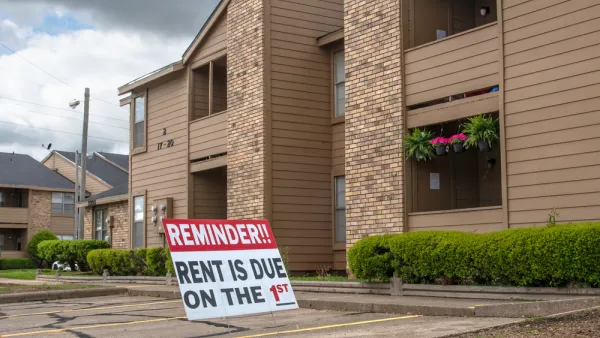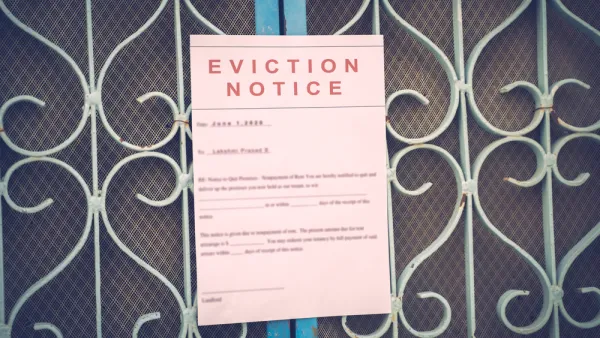Independent landlords struggle to keep up with the cost of rental units and continue to face massive income drops caused by eviction moratoriums. Some of them are pushing back.

Nationwide eviction bans in the name of public safety and economic security during the coronavirus pandemic have kept millions of renters in their homes, protected from displacement. Katy O'Donnell says the bans have produced "an unintended side effect" of threatening the livelihoods of residential landlords.
"The sweeping order effectively requires landlords to subsidize distressed tenants’ housing through the end of the year or face criminal penalties and hefty fines. That’s a tall order for the country’s 8 million independent landlords — most of whom lease a unit here or there on property they own without the financial backing of professional management companies," writes O'Donnell.
Some of the landlords to which O'Donnell refers are the owners of single-family buildings with one to four units, which make up for 22 million units in the United States, according to research by the Urban Institute. With the expiration of the CARES act in late July, and without a new financial relief package in the works, lobbyists are working on behalf of building owners to urge Congress to pass some form of rental assistance.
Housing advocates say that investment in rental aid would help renters and landlords alike. Aid slows ever-growing back rent for tenants and generates some income for landlords who must provide rental subsidies during the pandemic.
"Landlords are also challenging Trump's action in court," O'Donnell reports. "A Virginia landlord filed the first federal challenge to the new order on Tuesday, arguing that the CDC is misinterpreting its authority under a 1944 public health law that gives the agency certain powers to prevent communicable diseases from crossing state lines."
Landlords say that the moratorium put in place by the Centers for Disease Control is the equivalent of a state law rewrite. “If the CDC is right, that that regulation allows them to basically do anything they want to as long as they say it’s for public health, then there’s no limit,” laments attorney Caleb Kruckenberg.
FULL STORY: The flip side of Trump's eviction ban: Landlords face big crunch

Analysis: Cybertruck Fatality Rate Far Exceeds That of Ford Pinto
The Tesla Cybertruck was recalled seven times last year.

National Parks Layoffs Will Cause Communities to Lose Billions
Thousands of essential park workers were laid off this week, just before the busy spring break season.

Retro-silient?: America’s First “Eco-burb,” The Woodlands Turns 50
A master-planned community north of Houston offers lessons on green infrastructure and resilient design, but falls short of its founder’s lofty affordability and walkability goals.

Test News Post 1
This is a summary

Analysis: Cybertruck Fatality Rate Far Exceeds That of Ford Pinto
The Tesla Cybertruck was recalled seven times last year.

Test News Headline 46
Test for the image on the front page.
Urban Design for Planners 1: Software Tools
This six-course series explores essential urban design concepts using open source software and equips planners with the tools they need to participate fully in the urban design process.
Planning for Universal Design
Learn the tools for implementing Universal Design in planning regulations.
EMC Planning Group, Inc.
Planetizen
Planetizen
Mpact (formerly Rail~Volution)
Great Falls Development Authority, Inc.
HUDs Office of Policy Development and Research
NYU Wagner Graduate School of Public Service




























